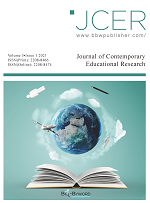Abstract
This article explored the influence of working memory capacity on the frequency of self-repairs. The narrative task and listening span task were used. Twenty post-graduate students participated in this study. Overall, the results of this study illustrated that the working memory is a factor of self-repairs. Speakers who have higher working memory capacity produce lesser self-repairs. This finding provides teachers with a new insight into second language teaching; that is, teachers can improve the amount of lexical knowledge when teaching students who have lower working memory in order to help them produce more accurate language during the process of L2 speech production.
References
Van Hest E, 1996, Self-Repair in L1 and L2 Production, Tilburg University Press, Tilburg. https://www.millisecond.com/download/library/listeningspan/
O’Connor N, 1988, Repairs as Indicative of Interlanguage Variation and Change, Georgetown University Round Table in Languages and Linguistics, 251-9.
Garrett M, 1975, The Analysis of Sentence Production, in Psychology of Learning and Motivation (Volume 9), Bower G, Academic Press, New York.
Cutler A, 2011, Slips of the Tongue and Language Production, Walter de Gruyter.
Kormos J, 1999, Monitoring and Self-Repair in L2. Language Learning, 49(2): 303-42.
Selinger H, 1980, Utterance Planning and Correction Behavior: Its Function in the Grammar Construction Process for Second Language Learners, in Towards a Cross-Linguistic Assessment of Speech Production, Dechert H, Raupach M, Lang, Cirencester.
Levelt WJ, 1983, Monitoring and Self-Repair in Speech. Cognition, 14: 41-104.
Mojavezi A, Ahmadian MJ, 2014, Working Memory Capacity and Self-Repair Behavior in First and Second Language Oral Production. Journal of Psycholinguistic Research, 43(3): 289-97.
Fortkamp MBM, 2000, Working Memory Capacity and L2 Speech Production: An Exploration Study.
Levelt WJ, 1989, Speaking: From Intention to Articulation, MIT press, Cambridge.
Temple L, 1997, Memory and Processing Modes in Language Learner Speech Production. Communication and Cognition, 30(1): 75-90.
Daneman M, Carpenter PA, 1980, Individual Differences in Working Memory and Reading. Journal of Verbal Learning and Verbal Behavior, 19(4): 450-66.
